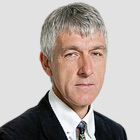Whatever it takes. With those three words the then head of the European Central Bank quashed doubts in July 2012 about whether the euro had a future. Mario Draghi’s message to the financial markets was that they should not doubt his commitment to defend the single currency. The warning worked.
Ten years later, the ECB is again in the spotlight, but so are two other major central banks – the US Federal Reserve and the Bank of England. All three are facing the same problem: what to do about annual inflation rates that are nudging 10%.
A crucial month kicks off on Thursday when the ECB will raise interest rates for the first time in 11 years. With neat symmetry, Draghi is once again playing a pivotal role, this time by threatening to quit as Italy’s prime minister.
The prospect of the ECB toughening its stance had already alarmed the markets even before a political crisis in the eurozone’s third biggest economy loomed. Investors demanded a higher premium for financing Italy’s huge national debt so – in an echo of events in 2012 – the yield (or interest rate) on Italian bonds has risen. The gap – or spread – when comparing with German bond yields can be expected to widen further should Draghi resign.
This creates a dilemma for the ECB. On the one hand, it is committed to tackling inflation but on the other it wants to minimise the impact on Italy. “No matter if Italy goes into turmoil or not, the ECB will have to hike rates this week, and say that they will do more if needed in the coming meetings,” said Ipek Ozkardeskaya of Swissquote bank.
Christine Lagarde, Draghi’s successor as ECB president, said her team would come up with a new instrument to shield Italy from any adverse impact of higher rates, and the financial markets expect her to deliver this week.
“Ten years after Draghi’s pledge to do whatever it takes, Christine Lagarde risks repeating history,” said Neil Shearing, chief economist at Capital Economics. “She must avoid drifting into another crisis that would ultimately require her to make a similar pledge to her predecessor.”
The weakness of the euro against the US dollar is an added complication, and one reason for the single currency falling below parity for the first time in two decades earlier this month is that US interest rates are already at 1.5%-1.75% while the ECB’s main interest rate is zero.
So after this week’s decision in Frankfurt, attention will shift to Washington DC. Whereas the decision for the ECB boils down to whether interest rates should rise by 0.25 or 0.5 percentage points, the Fed is mulling whether to tighten by 0.75, or even a full percentage point.
Up until the release of the latest US cost of living data, the assumption on Wall Street was that the Fed chair, Jerome Powell, and his colleagues would repeat June’s 0.75 point increase. However, last week’s news that inflation had jumped to a 40-year-high of 9.1% unsettled investors by prompting fears of a tougher response.
Krishna Guha, of Evercore, the investment bank advisory firm, said the signs were that the Fed would opt for the smaller 0.75 increase.
“This is still a big move and we expect the Fed will be resolutely hawkish in terms of the rate path [the future course of borrowing costs], but sticking to a steadier sequence of hikes reduces the risk that the Fed overshoots badly – ie raises rates much more than ultimately turns out to be required to tame inflation.”
The same tricky balancing act – preventing inflation from becoming embedded while at the same time avoiding sending the economy into recession – is causing headaches at the Bank of England, which will be the last of the three central banks to announce its policy decision.
Threadneedle Street’s monetary policy committee (MPC) has raised interest rates at its last five meetings. They currently stand at 1.25%. A sixth increase is seen by the City as a nailed-on certainty for early August, with opinion divided on whether the Bank will opt for a quarter or half-point increase. Andrew Bailey, the Bank’s governor said earlier this week both would be on the table at the MPC’s early August meeting.
The UK’s annual inflation rate, which rose to 9.4% in June, is forecast to reach 11% later this year, intensifying a squeeze on living standards that already threatens to send the economy into reverse. Capital Economics is convinced the Bank will continue to raise rates to 3% even though it will mean doing so while the economy is in recession for the first time since 1975.
Others think the MPC will go easier as it grapples with 1970s-style stagflation. James Sproule of Handelsbanken, thinks the Bank will stop raising rates when they get to 1.75%.
The choice – as Michael Saunders said in his valedictory speech as an MPC member last week – boils down to whether the Bank, the Fed and the ECB would rather risk doing too much too soon, or too little too late. Two things are certain: a “whatever it takes” approach to inflation will be costly – and the credibility of all three banks is firmly on the line.











